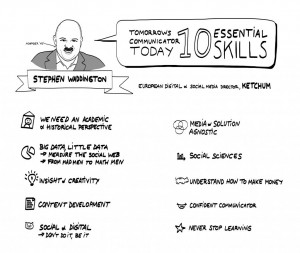Seven habits of highly successful practitioners

About the author
Richard Bailey Hon FCIPR is editor of PR Academy's PR Place Insights. He teaches and assesses undergraduate, postgraduate and professional students.

Public relations is something everyone does; it’s a natural characteristic of our social natures that we connect and communicate. But not everyone makes a good living doing these things professionally.
This article explores the seven traits you will need to develop if you’re to make it to the top.
It’s a tough challenge to do them all well, but if you can identify your strengths and weaknesses then you will know what you need to work on.
The list is mine, but I draw on two very good recent sources. One is Anne Gregory and Paul Willis’s new book, Strategic Public Relations Leadership, which lists five responsibilities of PR leaders.
The other is Stephen Waddington’s presentation at the PR Show 2013 (and accompanying blog post) which lists ten skills for the future PR practitioner.
The communicator
This is the area in which students and young practitioners can make most progress. At one level it comes down to verbal skills (language, grammar, spelling); at another there are technical skills (such as using software and being able to visualise data) and media skills.
Is your blog a stagnant backwater? Do you hate giving presentations? Are you curious to learn new languages? Are you as adept with pictures as with words? These may all indicate whether you’re developing as a communicator.
The networker
Public relations clearly involves developing (professional) relationships. Students should ask themselves whether they’re developing relationships with practitioners. LinkedIn, Twitter, Google+ and other social networks can all help – but there’s nothing to beat old-fashioned networking. Have you attended events? Have you introduced yourself? Are you a student member of the CIPR and the PRCA?
The geek
There’s always been a role for the avid reader and researcher since you can never know too much. But the rise of digital data (‘big data’) means there’s an emerging role for the technical expert who can set up digital dashboards and monitor conversations in real time.
Public relations is driven by insights, so mastery of the many new tools available to the practitioner is a valuable asset.
Remember Second Life? MySpace? Quora? Not every much-hyped new thing becomes mainstream, so can you articulate why organisations should invest time in Instagram, Pinterest or Google+. The geek should be an experimenter, but must also develop judgement.
The planner
Gregory and Willis acknowledge that rigid thinking is doomed in a chaotic world. But planning has many virtues beyond the production of the plans themselves, not least its ability to produce insight from research and to help anticipate future risks and opportunities.
The best planners are strategic thinkers, not just tactical doers. So do you know the difference between outputs and outcomes, between process and outcome objectives?
The catalyst
Catalysts are at the heart of the action: they make things happen to defend the values and relationships that are critical to organisational success. This is above and beyond a student’s experience, but you will know if you are a leader or a follower among your friends and colleagues. So what have you achieved above and beyond your grades? Is this reflected on your CV, in your portfolio and on LinkedIn?
The consultant
Imagine telling a patient that they have a terminal and incurable condition? It requires great expertise (you need to be right), great tact and empathy. Now imagine telling your boss that they’re wrong. It may threaten your job and your potential career, so will you tell the truth (as you see it) or will you duck the challenge?
Again, these scenarios will be beyond a student’s experience, but there are frameworks that can prepare you for the tough moments ahead. Have you reflected on your ethical position; have you thought about the value you add to an organisation in a PR role?
Public relations has very few behind-the-scenes roles, so you may find yourself advising senior executives from a very early age. How can you prepare for this challenge?